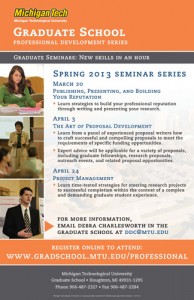Just a reminder that tomorrow, March 15th from 12:00 to 1:00 in Ballroom A-1 of the Memorial Union Building, is the session on the NIH Individual Graduate Fellowship Opportunity (Ruth L. Kirschstein National Research Service Award NRSA).
Dr. Tammy Donahue, who has served on the NIH study section for NRSA awards 5 times, and Dr. Jason Carter, who has active research support from NIH and a comprehensive understanding of the NRSA, will provide insight and explanation on the different NRSA funding mechanisms, an understanding of the role of institutes in funding decisions, and how to determine if NIH is a good fit for interested applicants or if NSF or others are better. Specific proposal development tips will be given on the four main proposal components: candidate qualifications, training plan, mentor statement, and research plan.
Graduate students and faculty will gain an understanding of who should apply, what is involved in preparing an application, specific tips for writing a successful NRSA, and an inside perspective on the criteria which reviewers use to evaluate applications.
Register for this event at: http://www.admin.mtu.edu/research/vpr/registration/
Drinks and dessert will be provided.
Please contact Jodi Lehman (jglehman@mtu.edu) at 487-2875 with any questions.
